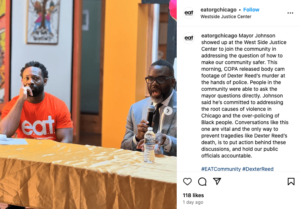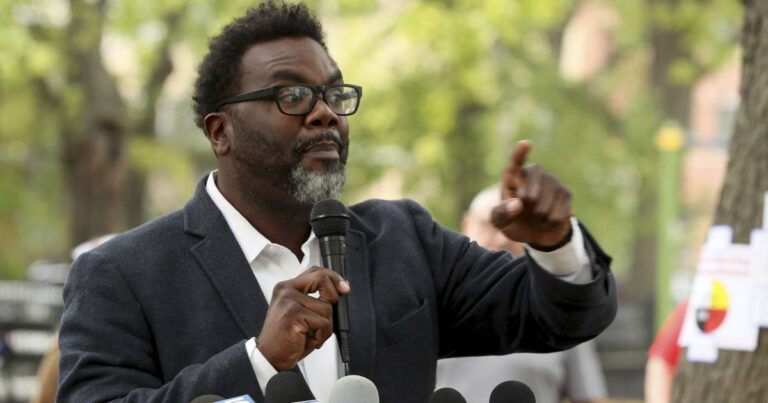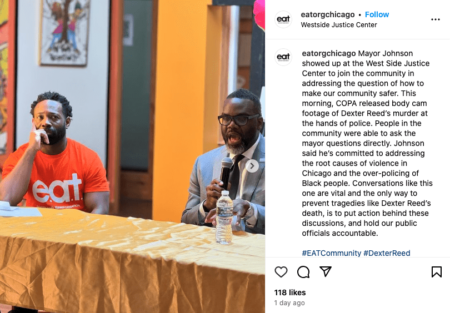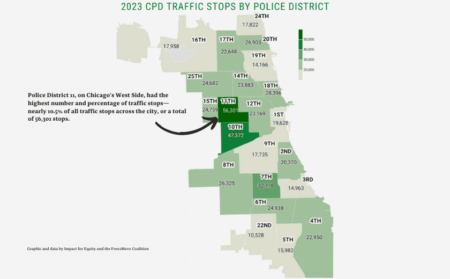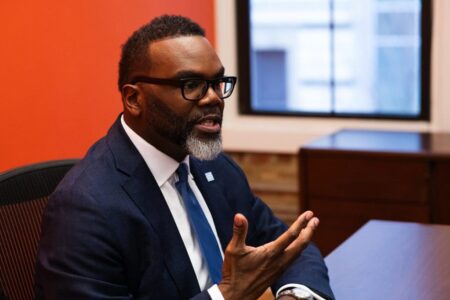Cook County Commissioner Brandon Johnson will run for Chicago mayor, adding another progressive challenger to the field of 2023 candidates and raising the prospect of a rematch between the Chicago Teachers Union and Mayor Lori Lightfoot.
Johnson’s announcement early Thursday is not a surprise. At a recent forum in Logan Square for progressive contenders, Johnson repeatedly said “when I’m mayor” in response to questions and he has long been considered a possible candidate for the post. Johnson, a longtime CTU member, first won public office in 2018, when in the Democratic primary he defeated Cook County Commissioner Richard Boykin, who earned the ire of organized labor by voting against the county’s soda tax, and is a longtime CTU leader.
Advertisement
In a release formally announcing his candidacy, Johnson highlighted his background as a teacher and planned a news conference later Thursday morning near Jenner School, where he started his career in education before it merged with Ogden International School.
“As a teacher, I experienced the painful impact of disinvestment on my students and their families, and this personal experience – seeing children endure inequity – is what fuels my commitment to building a stronger, safer and more equitable Chicago,” Johnson said.
Advertisement
During his first term on the county board, Johnson pushed a measure making it illegal to refuse to show or rent property to people with certain criminal records and also drafted a symbolic resolution that supported diverting money from policing in the wake of nationwide protests demanding police budgets be defunded.
He is also longtime critic of the city’s political establishment. At the recent forum, for instance, the candidates were asked about how to make Chicago a place where Black residents can thrive.
“Can we just be honest? They don’t want Black people here,” Johnson said, before listing policies he says drove that population out, such as demolishing public housing and closing schools. “And every administration has been willing to do that, whether it’s calling for ‘shoot to kill’ or raising bridges. It’s a wicked and unjust system.”
[Who’s in, who’s out and who’s thinking about running for Chicago mayor]
Johnson enters a crowded field that includes Lightfoot, Ald. Sophia King, activist Ja’Mal Green, Ald. Roderick Sawyer, former CPS chief Paul Vallas, state Rep. Kambium “Kam” Buckner, Ald. Raymond Lopez and businessman Willie Wilson.
Earlier this fall, Johnson, a former social studies teacher, picked up the endorsement of the CTU, which contributed $59,900 to Johnson’s political fund. The Illinois Federation of Teachers has said it would provide him with $1 million for his race.
For his part, Johnson has touted his time as a CTU organizer. At the progressive forum, Johnson evoked the memory of the 2012 seven-day teachers’ strike and called for reigniting that passion citywide to advance his platform.
“Let’s go into every single neighborhood, and let’s bring a revival,” Johnson said.
Advertisement
Johnson’s entry into the race presents a significant challenge for Lightfoot, who has long wrangled with CTU and other progressive heavyweights during her first term. She presided over an 11-day strike teachers’ strike in 2019 and multiple rounds of standoffs with the union during the COVID-19 pandemic over her plan to return to in-person schooling.
Lightfoot has also placed herself at odds with progressives over criminal justice, refusing to cater to the “defund the police” movement following the 2020 murder of George Floyd and often criticizing Cook County courts for what she said was a lack of consequences for violent offenders.
Lightfoot also will try to argue that she is a progressive mayor. Though she abandoned some high-profile promises supported by progressives, such as the elected school board plan that passed in Springfield, she has quietly built a strong relationship with some labor leaders who appreciate her record on worker issues.
In her first few months as mayor in 2019, Lightfoot pushed through the fair workweek ordinance that requires large Chicago employers to give workers at least two weeks notice of their schedules and compensate them for last-minute changes. Later that year, Lightfoot passed her first budget, which set the stage for a $15 minimum wage long sought by local unions.
She reached a compromise with aldermen to create an elected civilian police oversight agency — albeit with far weaker powers than she campaigned on — and closed loopholes in Chicago’s Welcoming City ordinance to prohibit police from cooperating with federal immigration authorities to deport immigrants living in the country without legal permission who have criminal backgrounds.
Advertisement
